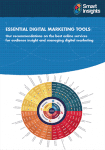Content Marketing is evolving into an era of hyper-personalisation
One of the more advanced pieces of advice we tend to give to people looking to improve their content marketing is to make better use of personalisation. It's easy to see why. If you can target people will content that is far more likely to appeal to them based on what they're interested it, then they're far more likely to engage with that content, spend longer on the site and once you've hooked them in you can set about trying to convert.
It's a simple narrative based on simple logic. But does it hold up to rigorous analysis? When we're A/B testing various different types of messaging on Smart Insights, it's not always the one that you'd logically think should work best that ends up performing optimally. The best way to find out the answer is to test, test and then test again. To help us test our hyposthis that personalised content performs better, Demand Metric have just released a new study on the effectiveness of content personalisation which means we can analyse some hard data on the subject, crunch some numbers and show exactly what difference personalisation makes to your content marketing efforts. The graphs don't lie.
The study
The survey by Demand Metrics collected responses from 190 businesses. The majority of these businesses happened to be B2B organisations, but they spanned a large range of industries. The companies were also of all different sizes. About 1/5th had revenue of over $1 billion annual, whilst 1/3 had less than $10 million in revenue.
Intentions
First of all, it is useful to look at what these businesses expect to be doing with content personalization in future. Of the businesses in the survey, 75% reported that they were seeing revenue growing year on year, whilst only 11% reported any kind of decline in revenue. So generally speaking the intentions of these companies represent the plans of successful companies which are reaping the benefits of content marketing and digital transformation more broadly. The study asked the businesses how they intended on using personalisation in the next year, and the results were almost unanimous.
A whopping three-quarters said they were planning on increasing their use of personalisation, whilst a paltry 2% said they were planning a decrease. It would be interesting to see how these intentions correlate with companies revenue growth.
Current state of personalisation
It is clear from the graph before that the vast majority of marketers are at least starting to use some form of personalisation with their content marketing efforts.

Fully 4/5ths of the respondents found personalised content to be at least somewhat more effective. A testament to the power of personalisation, and great news for anyone who's been investing in personalisation capabilities.
What's preventing further personalisation?
If personalisation is so effective, it begs the question why aren't move marketers utilising it? The answer seems to lie in the twin problems of technology and resources. Many of these companies by benefit from looking at buying some content personalisation software. There are now a wide range of providers and solutions which work almost straight out of the box, rather than requiring complicated implementations.
For people struggling to understand the different options for content personalisation, we have a free guide which takes you through the pros and cons of 150+ different pieces of marketing software, which has a detailed section on content personalisation tools.
Automation is underused
Of all the graphs in the report, this was actually the most surprising. Content personalisation is extremely time-consuming if not automated, so it was shocking that 27% were doing it entirely manually, and 40% were only using a little automation.
There are plenty of software solutions to automate at least some aspects of content personalisation, so there isn't really any reason to be doing everything manually. I think with a couple more years this graph will be inverted, with only a few laggards still doing things entirely manually, and the majority will have the process mostly automated.
If you want more insights into content personalisation from the Demand Metrics report, you can download it here. You'll have to give some details to access it though.
from Smart Insights http://ift.tt/23lnttk
via IFTTT






0 comments:
Post a Comment